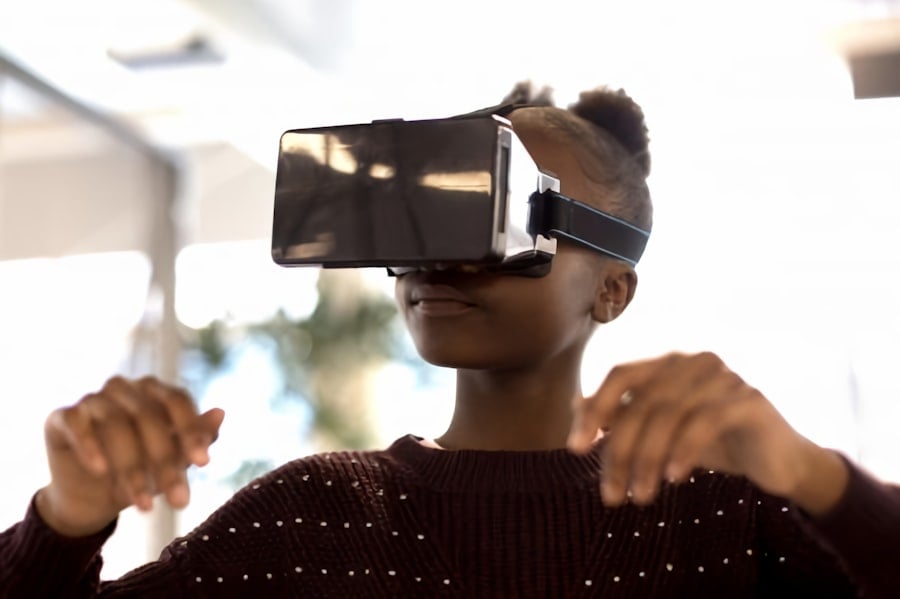In October 2021, Facebook announced its rebranding to Meta, a decision that significantly impacted the technology industry. This change reflected the company’s strategic shift towards developing the metaverse, a concept of interconnected virtual spaces. The rebranding included a new logo and corporate identity, emphasizing Meta’s commitment to advancing technologies that merge virtual and physical realities.
The transition from Facebook to Meta represents a crucial development in the evolution of digital technology and the internet. By focusing on the metaverse, Meta aims to pioneer new forms of human-computer interaction and digital experiences. Mark Zuckerberg, the company’s CEO, has articulated a vision of the metaverse as an immersive virtual environment that could transform various aspects of daily life, including work, entertainment, and social interactions.
This rebranding strategy positions Meta at the forefront of emerging digital technologies and signals the company’s long-term commitment to shaping the future of online experiences. The move reflects broader industry trends towards more immersive and interconnected digital platforms, potentially influencing the direction of technological development in the coming years.
Key Takeaways
- Facebook rebrands to Meta, signaling a shift towards building the metaverse.
- The metaverse is a virtual shared space created by the convergence of virtually enhanced physical reality and physically persistent virtual reality.
- Meta’s vision for the future involves creating a connected, immersive digital world that transcends physical boundaries.
- Privacy, security, and ethical considerations are key challenges and concerns surrounding the development of the metaverse.
- The metaverse has the potential to transform industries such as gaming, entertainment, education, and remote work, presenting new opportunities for innovation.
Understanding the Metaverse: What is it and How Will it Impact Our Lives?
Advancements in Technology Bring the Metaverse Closer to Reality
In recent years, the concept of the metaverse has gained significant traction as advancements in virtual reality (VR), augmented reality (AR), and other technologies have brought us closer to realizing this vision. The impact of the metaverse on our lives is expected to be profound and far-reaching.
A New Era of Socialization, Entertainment, and Commerce
In the metaverse, users will be able to socialize, work, play games, attend events, and even shop in virtual environments that mimic the real world. This has the potential to transform how we connect with others, consume media, and conduct business. The metaverse could also open up new opportunities for creativity and self-expression, as users are no longer bound by the limitations of physical space.
Addressing the Challenges and Concerns of the Metaverse
However, the metaverse also raises important questions about privacy, security, and ethical considerations that must be addressed as we navigate this new digital frontier.
Meta’s Vision for the Future: Building the Metaverse

Meta’s vision for the future revolves around building the metaverse – a connected virtual space that transcends physical boundaries and offers new possibilities for human interaction and expression. The company’s rebranding to Meta represents a strategic shift towards realizing this vision, as it seeks to position itself as a leader in shaping the future of digital experiences. Meta’s CEO, Mark Zuckerberg, has outlined ambitious plans for the metaverse, envisioning it as a place where people can work, play, learn, and connect in ways that were previously unimaginable.
To bring this vision to life, Meta is investing heavily in research and development across a range of technologies, including virtual reality, augmented reality, artificial intelligence, and connectivity infrastructure. The company is also collaborating with industry partners and developers to create a diverse ecosystem of virtual experiences that will form the building blocks of the metaverse. Meta’s commitment to building the metaverse is underscored by its belief that this new digital frontier has the potential to unlock unprecedented opportunities for innovation and human connection.
Challenges and Concerns: Privacy, Security, and Ethical Considerations
| Category | Challenges and Concerns |
|---|---|
| Privacy | Data breaches, unauthorized access, lack of control over personal information |
| Security | Cyber attacks, malware, phishing, ransomware |
| Ethical Considerations | Data misuse, discrimination, bias in algorithms, ethical decision-making |
As we embark on the journey towards the metaverse, it is important to acknowledge the challenges and concerns that come with this new frontier. Privacy and security are top of mind for many as we consider the implications of living and interacting in a fully immersive digital environment. The metaverse raises questions about data privacy, user safety, and digital identity that must be addressed to ensure a safe and secure experience for all users.
Additionally, ethical considerations around content moderation, digital rights, and virtual economies will require careful thought and proactive measures to mitigate potential risks. Another concern is the potential for the metaverse to exacerbate existing social inequalities and create new forms of exclusion. As access to technology and digital literacy become increasingly important in our daily lives, there is a risk that those who are unable to participate in the metaverse will be left behind.
It is crucial for companies like Meta to consider these implications and work towards creating an inclusive metaverse that benefits all members of society. By addressing these challenges and concerns head-on, we can ensure that the metaverse becomes a force for positive change and collective advancement.
Opportunities and Innovations: How the Metaverse Will Transform Industries
The emergence of the metaverse presents exciting opportunities for innovation across a wide range of industries. From entertainment and gaming to education and healthcare, the metaverse has the potential to revolutionize how we engage with content and services. In the entertainment industry, for example, the metaverse could enable new forms of interactive storytelling and immersive experiences that blur the lines between fiction and reality.
Similarly, in healthcare, virtual environments could be used for telemedicine, medical training, and therapy sessions, offering new ways to deliver care and support to patients. The metaverse also holds promise for businesses looking to connect with consumers in novel ways. Virtual storefronts and immersive shopping experiences could transform e-commerce, offering customers a more engaging and personalized shopping experience.
Additionally, remote work could be revolutionized by the metaverse, as teams collaborate in virtual offices that transcend geographical boundaries. These are just a few examples of how the metaverse has the potential to transform industries and create new opportunities for growth and innovation. As companies like Meta continue to invest in building the metaverse, we can expect to see even more exciting developments in the years to come.

A New Era of Social Experiences
This could include new social experiences that allow users to connect with friends and family in virtual spaces, as well as innovative ways to consume media and engage with content.
New Opportunities for Creators and Developers
Additionally, Meta’s investment in building the metaverse is likely to result in new opportunities for creators and developers to build and monetize virtual experiences.
Data Management and Privacy in the Metaverse
At the same time, users can also expect changes in how their data is managed and used within Meta’s ecosystem. As the company expands its presence in virtual environments, it will be important for users to understand how their personal information is being collected and utilized. Meta has emphasized its commitment to privacy and security as it builds the metaverse, but users should remain vigilant about their digital footprint and take proactive steps to protect their data. By staying informed about Meta’s rebranding and its implications for their digital experiences, users can navigate this transition with confidence and make informed decisions about their online presence.
Embracing the Metaverse: How Individuals and Businesses Can Prepare for the Future
As we look towards the future of the metaverse, individuals and businesses can take proactive steps to prepare for this new digital frontier. For individuals, this could involve familiarizing themselves with virtual reality technology and exploring new ways to connect with others in virtual environments. It may also involve staying informed about privacy best practices and taking steps to protect their digital identity as they engage with virtual experiences.
Businesses can prepare for the metaverse by exploring opportunities to leverage virtual environments for customer engagement, employee collaboration, and product innovation. Additionally, businesses can invest in upskilling their workforce to adapt to new digital tools and platforms that will become essential in the metaverse. By embracing this shift towards a more interconnected digital world, individuals and businesses can position themselves at the forefront of innovation and create new opportunities for growth and success.
As companies like Meta continue to build the metaverse, it will be important for individuals and businesses to remain adaptable and open-minded as they navigate this transformative period in digital technology. Embracing the metaverse offers exciting possibilities for collaboration, creativity, and connection that have the potential to shape our future in profound ways.
Facebook’s rebrand to Meta has sparked a lot of interest in the concept of the metaverse. For those looking to learn more about this virtual world, an article on multi-universe concepts provides a great introduction to the idea of multiple interconnected virtual realities. This article delves into the potential of the metaverse and how it could revolutionize the way we interact with technology and each other.
FAQs
What is the rebranding of Facebook to Meta?
The rebranding of Facebook to Meta is a strategic move by the company to reflect its focus on building the “metaverse,” a virtual reality space where people can interact, work, and play in a digital environment.
Why did Facebook rebrand to Meta?
Facebook rebranded to Meta to signal its shift in focus from being a social media company to becoming a metaverse company. The rebranding reflects the company’s long-term vision for the future of the internet and digital experiences.
What is the metaverse?
The metaverse is a collective virtual shared space, created by the convergence of virtually enhanced physical reality and physically persistent virtual reality. It is a vision of a future internet where people can interact, work, and play in a digital environment.
How will the rebranding to Meta impact Facebook’s existing products?
The rebranding to Meta will not impact Facebook’s existing products such as the Facebook app, Instagram, WhatsApp, and Oculus. These products will continue to operate under their current brand names, but will be part of the broader Meta company.
When will the rebranding to Meta take effect?
The rebranding to Meta was announced in October 2021, and the company has already started using the Meta name in its communications and branding. The transition to the Meta brand will continue to roll out over the coming months and years.











Leave a Reply